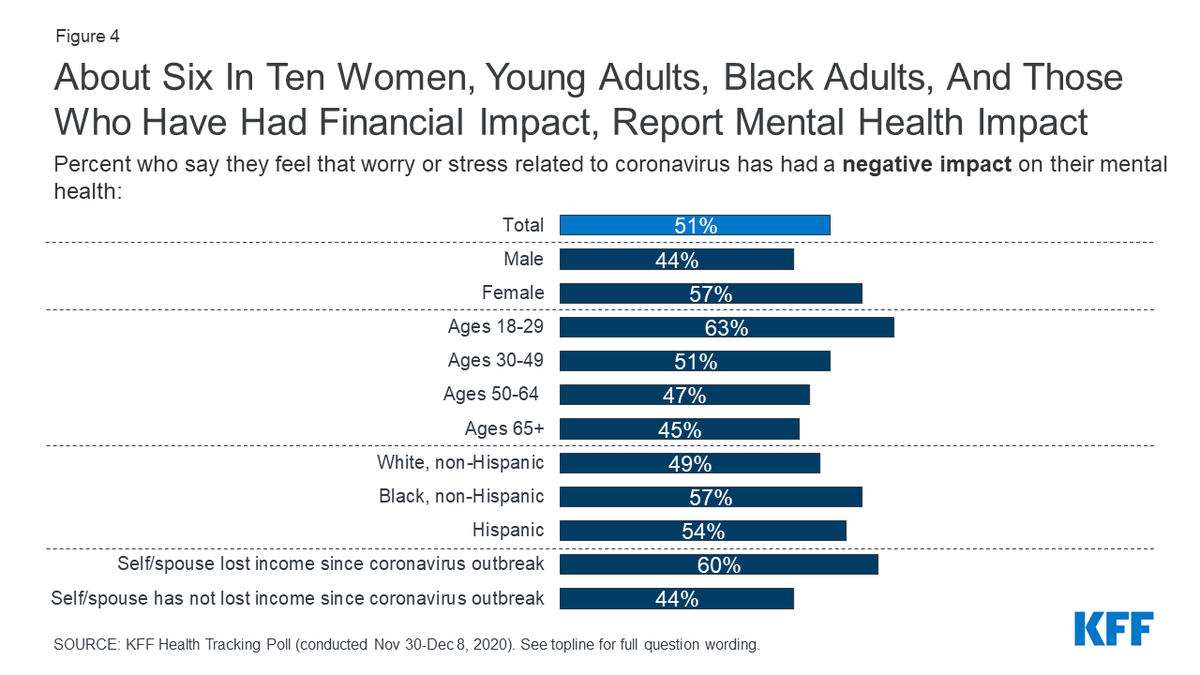What’s your one-tweet summary of what COVID-19 means for mental health & well-being?
I tried but can't fit all our findings here at KFF into just one tweet, so here’s a recap of what we know so far about mental health & substance use during the pandemic, and what may lie ahead:
I tried but can't fit all our findings here at KFF into just one tweet, so here’s a recap of what we know so far about mental health & substance use during the pandemic, and what may lie ahead:
About *SIX IN TEN* women, young adults, Black adults, and people who’ve been financially impacted say pandemic-related worry or stress has negatively impacted their mental health. Here’s the latest from KFF’s Health Tracking Poll: https://www.kff.org/coronavirus-covid-19/report/kff-health-tracking-poll-december-2020/
We looked at the data on worker mental health during the pandemic. In a word, it’s jeopardized. Both remote & on-site workers are at risk of adverse mental health outcomes. Essential workers, workers of color, & working women are particularly vulnerable. https://www.kff.org/policy-watch/both-remote-and-on-site-workers-are-grappling-with-serious-mental-health-consequences-of-covid-19/
The pandemic’s disruption of routines, finances, education, and medical care could have long-term implications for children's physical and mental health. One major concern: The higher risk of child abuse & neglect with cutbacks to child welfare services. https://www.kff.org/coronavirus-covid-19/issue-brief/childrens-health-and-well-being-during-the-coronavirus-pandemic/
13% of adults say they’ve started or increased substance use to cope during the pandemic. Our analysis of COVID-19’s implications explores the mental health risks linked to social isolation, job/income loss, & frontline work during a pandemic. https://www.kff.org/coronavirus-covid-19/issue-brief/the-implications-of-covid-19-for-mental-health-and-substance-use/
With distress so widespread, consider what California v Texas could mean for access to mental health care. Pre-ACA, a preexisting condition like depression might've meant denied coverage or higher premiums. Many plans didn’t cover mental health care at all https://www.kff.org/policy-watch/mental-illness-may-soon-be-most-common-pre-existing-conditions/
The incoming Biden administration could take administrative action without Congress to address some mental health & substance use issues, including suicide among LGBTQ youth, mental health parity, the opioid crisis, and school and veteran services. https://www.kff.org/health-reform/issue-brief/potential-health-policy-administrative-actions-under-president-biden/
Looking for quick, state-level info on mental health and substance use before the pandemic? Check out our state fact sheets, along with an analysis of variation across states in mental health outcomes, care access, and coverage: https://www.kff.org/interactive/mental-health-and-substance-use-state-fact-sheets/
Want to do your own comparison of national and/or state-to-state survey data on mental health and substance use? Make custom state reports with KFF's State Health Facts data collection: https://www.kff.org/statedata/collection/mental-health-substance-use-disorder/

 Read on Twitter
Read on Twitter


